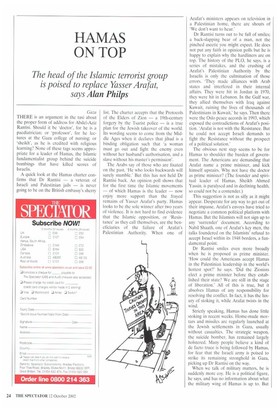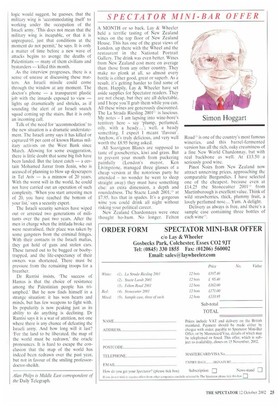HAMAS ON TOP
The head of the Islamic terrorist group is poised to replace Yasser Arafat,
says Alan Philps
Gaza THERE is an argument in the taxi about the proper form of address for Abdel-Aziz Rantisi. Should it be 'doctor', for he is a paediatrician; or `professor', for he lectures at the Gaza college of nursing; or 'sheikh', as he is credited with religious learning? None of these tags seems appropriate for a leader of Hamas, the Islamic fundamentalist group behind the suicide bombings that have killed scores of Israelis.
A quick look at the Hamas charter confirms that Dr Rantisi — a veteran of Israeli and Palestinian jails — is never going to be on the British embassy's sherry list. The charter accepts that the Protocols of the Elders of Zion — a 19th-century forgery by the Tsarist police — is a true plan for the Jewish takeover of the world. Its wording seems to come from the Middle Ages when it declares that jihad is a binding obligation such that 'a woman must go out and fight the enemy even without her husband's authorisation, and a slave without his master's permission'.
The Arabs say of those who are fixated on the past, `He who looks backwards will surely stumble.' But this has not held Dr Rantisi back. An opinion poll shows that for the first time the Islamic movements — of which Hamas is the leader — now enjoy more support than the frayed remains of Yasser Arafat's party. Hamas looks to be the sole winner after two years of violence. It is not hard to find evidence that the Islamic opposition, or 'Resistance' as they call themselves, are the beneficiaries of the failure of Arafat's Palestinian Authority. When one of Arafat's ministers appears on television in a Palestinian home, there are shouts of 'We don't want to hear.'
Dr Rantisi turns out to be full of smiles; a back-slapping bear of a man, not the pinched ascetic you might expect. He does not put any faith in opinion polls but he is happy to explain why the hardliners are on top. The history of the PLO, he says, is a series of mistakes, and the crushing of Arafat's Palestinian Authority by the Israelis is only the culmination of those errors. 'They made alliances with Arab states and interfered in their internal affairs. They were hit in Jordan in 1970, they were hit in Lebanon. In the Gulf war, they allied themselves with Iraq against Kuwait, ruining the lives of thousands of Palestinians in Kuwait,' he says. Then there were the Oslo peace accords in 1993, which exposed the contradictions of Arafat's position. 'Arafat is not with the Resistance. But he could not accept Israeli demands to fight the Resistance without the prospect of a political solution.'
The obvious next step seems to be for Hamas to shoulder the burden of government. The Americans are demanding that Arafat name a prime minister, and kick himself upstairs. Why not have the doctor as prime minister? (The founder and spiritual leader of Hamas, Sheikh Ahmed Yassin, is paralysed and in declining health, so could not be a contender.) This suggestion is not as silly as it might appear. Desperate for any way to get out of their impasse, Arafat's envoys have tried to negotiate a common political platform with Hamas. But the Islamists will not sign up to any 'surrender' document. According to Nabil Shaath, one of Arafat's key men, the talks foundered on the Islamists' refusal to accept Israel within its 1948 borders, a fundamental point.
Dr Rantisi smiles even more broadly when he is proposed as prime minister. `How could the Americans accept Hamas in the Palestinian leadership in the world's hottest spot?' he says. 'Did the Zionists elect a prime minister before they established their state? We are still in the stage of liberation.' All of this is true, but it absolves Hamas of any responsibility for resolving the conflict. In fact, it has the luxury of stoking it, while Arafat twists in the wind.
Strictly speaking, Hamas has done little stoking in recent weeks. Home-made mortars and missiles are regularly launched at the Jewish settlements in Gaza, usually without casualties. The strategic weapon, the suicide bomber, has remained largely holstered. Many people believe a kind of de facto truce is being followed by Hamas, for fear that the Israeli army is poised to strike its remaining stronghold in Gaza, picking up Dr Rantisi on the way.
When we talk of military matters, he is suddenly more coy. He is a political figure, he says, and has no information about what the military wing of Hamas is up to. But logic would suggest, he guesses, that the military wing is 'accommodating itself' to working under the occupation of the Israeli army. This does not mean that the military wing is incapable, or that it is unprepared, just that conditions at the moment do not permit,' he says. It is only a matter of time before a new wave of attacks begins to avenge the deaths of Palestinians — many of them civilians and bystanders — killed this month.
As the interview progresses, there is a sense of unease at discussing these matters. An Israeli missile could come through the window at any moment. The doctor's phone — a transparent plastic job with the innards exposed to view — lights up dramatically and shrieks, as if sounding the alert of an Israeli snatch squad coming up the stairs. But it is only an incoming call.
Talk of the need for 'accommodation' to the new situation is a dramatic understatement. The Israeli army says it has killed or captured 98 per cent of known Hamas military activists on the West Bank since March. Allowing for some exaggeration, there is little doubt that some big fish have been landed. But the latest catch — a certain Mohamed Jarrar from Jenin, who is accused of planning to blow up skyscrapers in Tel Aviv — is a minnow of 20 years. With the worst will in the world, he could not have carried out an operation of such complexity, When you start arresting men of 20, you have reached the bottom of your list,' says a security expert.
The Israeli security services have wiped out or arrested two generations of militants over the past two years. After the men in charge when the intifada broke out were neutralised, their place was taken by some gangsters from the criminal fringes. With their contacts in the Israeli mafias, they got hold of guns and stolen cars. These turned out to be bugged or boobytrapped, and the life-expectancy of their owners was shortened. There must be pressure from the remaining troops for a breather.
Dr Rantisi insists, 'The success of Hamas is that the choice of resistance among the Palestinian people has triumphed,' But he now finds himself in a strange situation: it has won hearts and minds, but has few weapons to fight with. Its popularity is now peaking just as its ability to do anything is declining. Dr Rantisi says it is a war of attrition, not one where there is any chance of defeating the Israeli army. And how long will it last? 'For the land to be liberated, the map of the world must be redrawn,' the oracle pronounces. It is hard to escape the conclusion that the map of the world has indeed been redrawn over the past year, but not in favour of the smiling professordoctor-sheikh.
Alan Philps is Middle East correspondent of the Daily Telegraph. A MONTH or so back, Lay & Wheeler held a terrific tasting of New Zealand wines on the top floor of New Zealand House, This has one of the great views of London, up there with the Wheel and the restaurant in the National Portrait Gallery. The drink was even better. Wines from New Zealand cost more on average than those from any other country. They make no plonk at all, so almost every bottle is either good, great or superb. As a result, it's getting harder to find some of them. Happily, Lay & Wheeler have set aside supplies for Spectator readers. They are not cheap, but they are all delectable, and I hope you'll grab them while you can. All these wines are generously discounted. The La Strada Riesling 2001'n is luscious. My notes – I am lapsing into wine-bore's territory here – say 'plump, perfumed, oily, with a heady...'; well, a heady something. I expect I meant 'flavour'. Anyhow, it's truly delicious, and very well worth the £8.95 being asked.
All Sauvignon Blanes are supposed to taste of gooseberries, kiwi and grass. But to prevent your mouth from puckering painfully (London's mayor, Ken Livingstone, managed three glasses of a cheap version at the notorious party he attended – no wonder he went to sleep straight away) they must have something else: an extra dimension, a depth and roundedness. The Staete Landt 2001,''at £7.95. has that in spades. It's a gorgeous wine you could drink all night without risking your political career.
New Zealand Chardonnays were once thought ho-hum. No longer. Felton Road'' is one of the country's most famous wineries, and this barrel-fermented version has all the rich, oaky creaminess of a fine New World Chardonnay, but with real backbone as well. At £13.50 a seriously good wine.
Pinot Noirs from New Zealand now attract unnerving prices, approaching the comparable Burgundies. I have selected one of the cheapest, because even at 1.14.25 the Stonecutter 20011 from Martinborough is excellent value. Think of wild strawberries, thick, plummy fruit, a lovely perfumed nose... Yum. A delight.
Delivery as always is free, and there's a sample case containing three bottles of each wine'''.



































































































 Previous page
Previous page